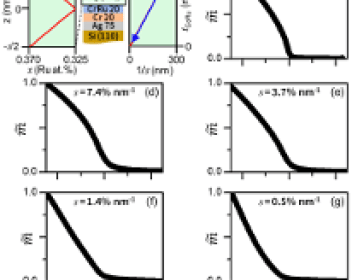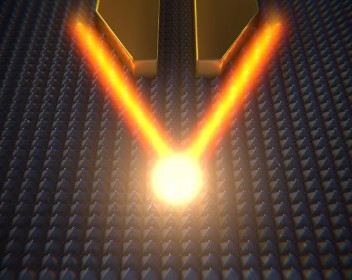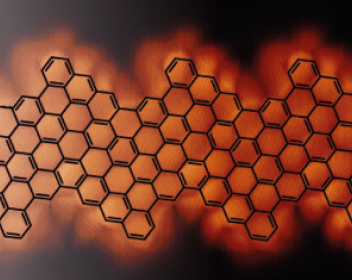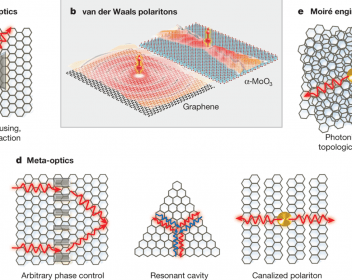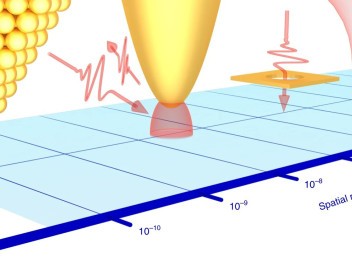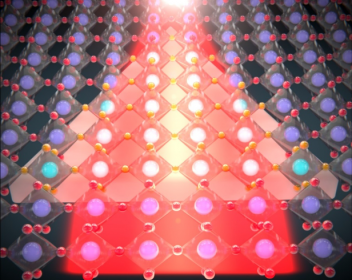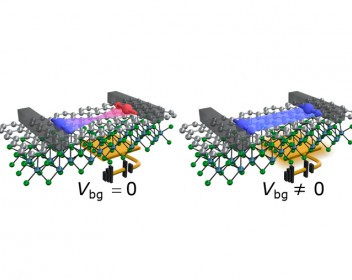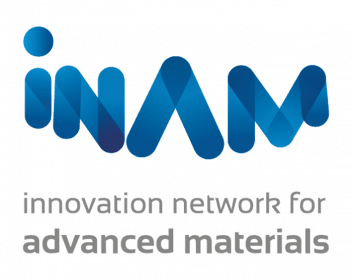Newsroom
News
Overriding Universality via nano-scale Materials Design
In a recent article published in Physical Review Letters (Phys. Rev. Lett. 127, 147201 (2021)), researchers from the Nanomagnetism group at nanoGUNE in collaboration with scientists from the US and Colombia have demonstrated that it is possible to design thermodynamic critical exponents a la carte and override the universality of phase transition behavior, which was previously understood to be only dependent on the dimensionality of sample and order parameter.
Researchers develop an innovative strategy to focus infrared light into the nanoscale
An international team of researchers, including members of nanoGUNE's Nanooptics group, publish in “Science Advances” the grounds for the realization of nanodevices that, based on the manipulation of light at the nanoscale, promise the development of extraordinarily sensitive biosensors. The researchers also designed gold nanoantennas that allow obtaining extremely small (600.000 times smaller than the size of a grain of sugar) and bright focal spots. This achievement opens new avenues for the detection and control of single molecules, such as glucose, and atmospheric contaminants.
Graphene nanoribbons for emerging quantum technologies
A multidisciplinary group of research teams, working in the framework of FET OPEN Project SPRING (www.springfetopen.eu), report that certain stripes of graphene called graphene nanoribbons (GNRs) acquire the anomalous topological state of matter when narrowed down to just a few nanometers in width. The research has been recently published in Nature Communications.
Review: Interface nano-optics with van der Waals polaritons
An international team, including the leader of the Nanooptics group at nanoGUNE, Rainer Hillenbrand, discusses in ‘Nature’ the state-of-the-art and opportunities for controlling the propagation of nanolight (in form of polaritons) in van der Waals materials with the help of classical refractive optics concepts, meta-optics and moire engineering.
Review: Nanoscale terahertz scanning probe microscopy
Four international experts, including the leader of the Nanooptics group at nanoGUNE Rainer Hillenbrand, analyze in ‘Nature Photonics’ the terahertz scanning probe microscopy techniques that achieve spatial resolution on the scale of micrometres to ångströms, with particular emphasis on their overarching approaches and underlying probing mechanisms, and they forecast the next steps in the field.
Understanding nanolight refraction on highly anisotropic materials
An international team of researchers, including members of nanoGUNE's Nanooptics group, unveils in ‘Nature Communications’ fundamental aspects of nanolight refraction in highly anisotropic media. The researchers also report the design of a new planar nanolens 1000 times smaller than the thickness of a human hair, which enables control of nanolight propagation, laying the groundwork for the development of photonic nanotechnologies with exciting possibilities.
CIC nanoGUNE renews its María de Maeztu distinction for scientific excellence
The National Research Council awards its "Severo Ochoa" and "Maria de Maeztu" hallmarks of excellence to a total of seven centers and six research units that stand out owing to the impact and international significance of their results. NanoGUNE has had its "Maria de Maeztu" distinction renewed and will receive funding to the tune of 500,000 euros per year over the coming four years.
Spin Control Without Magnetic Fields
Researchers from the Nanodevices Group at CIC nanoGUNE demonstrate that they can control the polarization direction of a spin current without having to apply a magnetic field, which could aid in implementing energy-efficient spintronics devices. The work has been published in Physical Review Letters.
NanoGUNE joins the Innovation Network for Advanced Materials (INAM)
Marco Donolato and Team, finalists for the European Inventor Award 2021
The European Patent Office (EPO) has nominated former nanoGUNE researcher Marco Donolato as finalist in the "Research" category of the European Inventor Award 2021 for its invention “Magnetic nanoparticles to diagnose disease”, a patent registered in collaboration with nanoGUNE Ikerbasque Research Professor Paolo Vavassori and Professor Mikkel Fougt-Hansen, from Technical University of Denmark (DTU). The invention led to the creation of a novel testing device which detects infectious diseases within minutes, enabling medical staff to begin treatment immediately and potentially saving millions of lives in countries struggling with diseases such as dengue fever.
Agenda
| Mon | Tue | Wed | Thu | Fri | Sat | Sun |
|---|---|---|---|---|---|---|
|
29
|
30
|
31
|
1
|
2
|
3
|
4
|
|
|
|
|
|
|
|
|
|
5
|
6
|
7
|
8
|
9
|
10
|
11
|
|
|
|
|
|
|
|
|
|
12
|
13
|
14
|
15
|
16
|
17
|
18
|
|
|
|
|
|
|
|
|
|
19
|
20
|
21
|
24
|
25
|
||
|
|
|
|
|
|
||
|
30
|
31
|
1
|
||||
|
|
|
|
Events
- 29/01/2026
Frontiers in Quantum Electronics
- 04/02/2026 to 06/02/2026
nanoGUNE Winter School 2026
nanoVISUALS
Find events' photos, experimental images, videos, audios, and nanoGUNE's corporate images.

